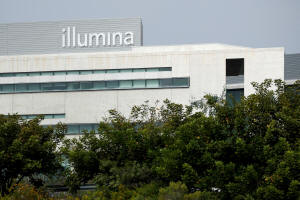Illumina launches multiple-gene test to spot rare treatable cancers
 Send a link to a friend
Send a link to a friend
 [March 15, 2022]
By Ludwig Burger [March 15, 2022]
By Ludwig Burger
(Reuters) - Genome sequencing group
Illumina on Tuesday launched a cancer test in Europe that checks for a
wide range of tumour genes in one tissue sample, potentially helping
patients with rare diseases to be matched up with treatment options.
The test, which Illumina says scans for more mutations than any
available kits, comes amid drug industry efforts to develop precision
oncology drugs for ever smaller patient groups defined by a genetic
profile. This has created pent-up demand for more sophisticated
diagnostic tools.
Illumina's TruSight Oncology Comprehensive test kit scans for 517
cancer-relevant genes across nearly 30 solid tumour types, it said in a
statement.
For instance, it reads out a patient's mutational burden score and
microsatellite instability status, which cancer researchers have said
indicate the need to be given immune drugs such as Merck & Co's Keytruda.
Also included is the TRK mutation, which is a genetic driver in less
than 1% of cancers and, due to its rarity, often goes untested even
though Bayer's Vitrakvi and Roche's Rozlytrek are available as approved
treatments.
Bayer has said it was struggling to encourage physicians to diagnose
patients that qualify for the niche drug.

[to top of second column]
|

One of the office complexes of Illumina, Inc is shown in San Diego,
California, U.S., October 9, 2020. REUTERS/Mike Blake
 "Consolidating all of the critical
biomarkers into a single comprehensive test improves the chances of
identifying treatment options that would otherwise require
time-consuming sequential gene tests from multiple biopsy
procedures," Illumina said.
The launch comes as Illumina is struggling to win over EU antitrust
regulators for its planned $8 billion bid for Grail Inc, which is
working on blood tests to diagnose early stage cancers.
Illumina said it was preparing to file for U.S. regulatory approval
for the test kit later this year.
Access to the European medical devices and diagnostics market is
easier because manufacturers routinely go through a process of
self-certifying that their products function as stated, without a
regulator as gate-keeper.
(Reporting by Ludwig Burger. Editing by Jane Merriman)
[© 2022 Thomson Reuters. All rights
reserved.] This material may not be published,
broadcast, rewritten or redistributed.
Thompson Reuters is solely responsible for this content. |